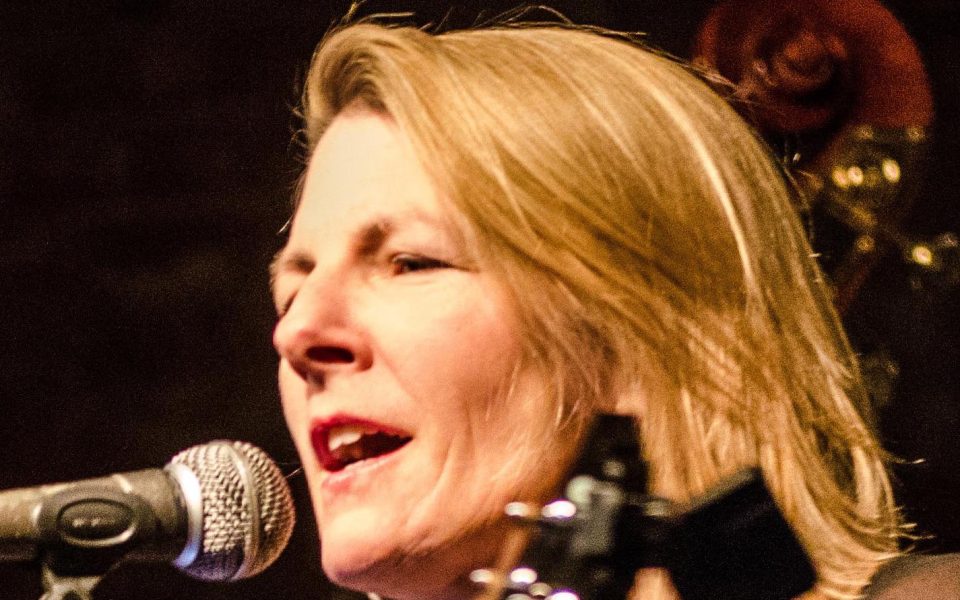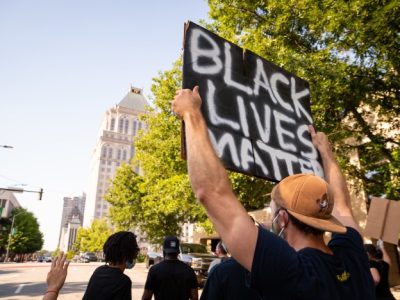It’s hard to think about the National Folk Festival completing its three-year run in Greensboro and not be reminded of the Gate City’s rich history of social justice, from the antebellum Quaker abolitionists through the birth of the sit-in movement in 1960, even including the tragic turn of the 1979 Klan-Nazi massacre. That’s why the Songs of Hope & Justice concert is an essential component of the festival.
While the festival proper highlights the best of regional folk music from across the country as a kind of celebratory national mosaic, it falls on the locals to carry the flame for music of conscience and protest. For the third year in a row, singer-songwriter Laurelyn Dossett hosts the Songs of Hope & Justice concert, an event sponsored by ArtsGreensboro, on the eve of the festival. (The 7.p.m. concert on Thursday in the Van Dyke Performance Space in the Greensboro Cultural Arts Center is free, but a $10 donation is suggested.)
When Dossett was drafted to organize the inaugural Songs of Hope & Justice concert in 2015, less than three months had passed since the murder of nine African-American parishioners at Emanuel AME Church in Charleston, SC by white supremacist Dylann Roof. Dossett knew that if she was going to curate a group of local voices, it had to be for something more meaningful than showcasing individual talents.
“If I have to get my brothers and sisters together, I’m going to do it with purpose,” she recalled. “It’s to raise our voices together for social justice, for the environment. It’s to speak to current issues and celebrate — celebration in the sense of what folk music has always been about. Not every song is a protest song, but there’s always been a tradition of speaking to labor issues, social justice or issues like saving the water.”
In the exhausting final weeks of the summer in Year 1 of Trump’s America, there is sadly no shortage of tribulation, and by the same token, no shortage of material for protest singers.
Listen to “Wasn’t That a Mighty Storm,” an early 20th Century folk song covered by Odetta and Nanci Griffith that memorializes the deadliest natural disaster in American history — the 1900 hurricane that destroyed Galveston, Texas — and tell me if you don’t flash on the image of families wading through waist-deep water in Houston in 2017. Look at those old photos of Woody Guthrie, with “This machine kills fascists” scrawled on his guitar, and see if you don’t experience a thrilling jolt of vicarious revenge towards the madman who carried out the deadly car-ramming attack in Charlottesville. For that matter, listen to Guthrie’s 1948 protest song “Deportee (Plane Wreck at Los Gatos),” with its refrain, “Who are all these friends all scattered like dry leaves?/ The radio say they are just ‘deportees’,” and try not to experience sorrow over the damage wrought by Trump’s order to rescind DACA.
The point, Dossett told me, is that these songs are as current now as they were when they were written, and the songs being written by her contemporaries today are part of the same canon.
“I think there’s sort of a misconception with Odetta and Pete Seeger and Woody Guthrie and the songs of the freedom riders that all that music with social commentary is a thing of the past, and it’s not,” Dossett said. “Most of those songs are just as true and just as relevant and today. Songs about civil rights from the early 1960s are just as relevant today as they were when they were written. We’re really trying to do two things. One is to honor the tradition of those older songs. The other is to shed light on new material. They’re not in relief; they’re one body of work.”
The concert will be presented more as a songwriter-in-the-round affair than as a talent showcase, with an emphasis on raising voices together in common purpose. Many though not all of the artists are longtime collaborators, including Molly McGinn, Sam Frazier, Jeffrey Dean Foster, Logie Meachum, Scott Manring, Alex Bingham, Eddie Garcia and Alex McKinney.
“Greensboro does have a deep and rich talent pool,” Dossett said. “That’s wonderful, but we also have a job. We need to just go ahead and embrace that notion for today and do it from here. Kelcey Ledbetter is from here; she has her own take on events. Eduardo Cisneros is a beautiful singer and guitar player. His mother is in sanctuary and is threatened with deportation. We don’t have to look far or think of issues or music as being of some place else. It’s all right here.”
Join the First Amendment Society, a membership that goes directly to funding TCB‘s newsroom.
We believe that reporting can save the world.
The TCB First Amendment Society recognizes the vital role of a free, unfettered press with a bundling of local experiences designed to build community, and unique engagements with our newsroom that will help you understand, and shape, local journalism’s critical role in uplifting the people in our cities.
All revenue goes directly into the newsroom as reporters’ salaries and freelance commissions.





Leave a Reply